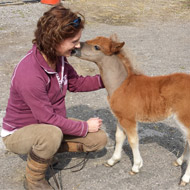
Checklist highlights legal requirements and main hazards
New guidance resources for employers with pregnant staff has been launched by MumsVet, the British Equine Veterinary Association’s (BEVA) platform for working parents.
The BEVA Checklist for Employers with Pregnant Staff and the Risk Assessment Form for New and Expectant Mothers are available as downloads for all working in the veterinary profession.
“The nature of equine work presents different challenges for pregnant women and working parents,” explained Vicki Nicholls, co-founder of MumsVet.
“Lone working, often out of hours in potentially dangerous environments with unpredictable patients, and the paucity of trained support staff in an ambulatory setting are specific challenges to equine vets both male and female. Add pregnancy into the mix and the challenges suddenly increase even further.”
The BEVA Checklist for Employers with Pregnant Staff provides key information to help support employers and highlight best practice. It covers the appropriate steps to take as well as the legal requirements when an employee announces she is pregnant, what to do during the pregnancy, through maternity leave and on return to work.
The Risk Assessment Form for New and Expectant Mothers gives examples of the main hazards likely to be encountered by equine vets, their associated risks and the appropriate measures.
“Used in conjunction with each other our two new resources will help to guide and reassure employers that they are taking the correct steps and will ensure that the entire team has been taken into consideration – and not just the pregnant person,” said Lucy Grieve, co-founder of MumsVet and member of BEVA Council.
“New and expectant mothers working in the right conditions within a safe environment will have added incentive to return to work after maternity leave, and importantly this will help retain the experience we need in the profession.”
Image (C) MumsVet



 The RCVS has announced a new version of its 1CPD mobile app, with enhanced features for veterinary surgeons and veterinary nurses to record their continuing professional development.
The RCVS has announced a new version of its 1CPD mobile app, with enhanced features for veterinary surgeons and veterinary nurses to record their continuing professional development.